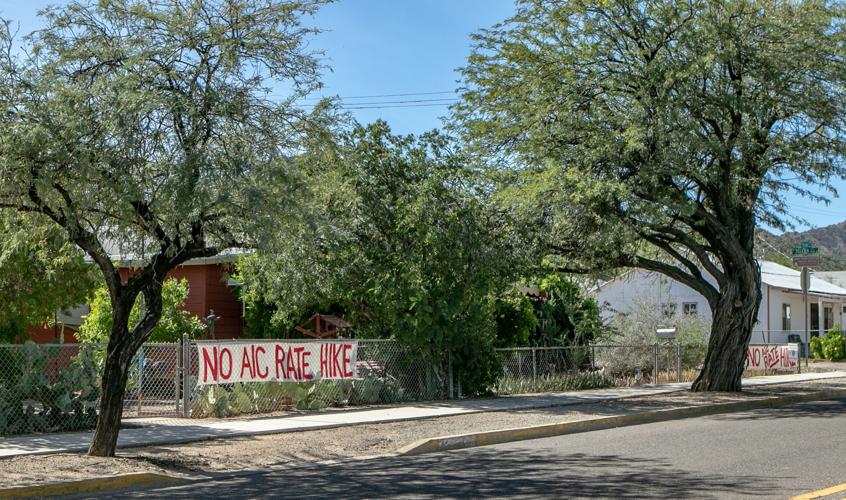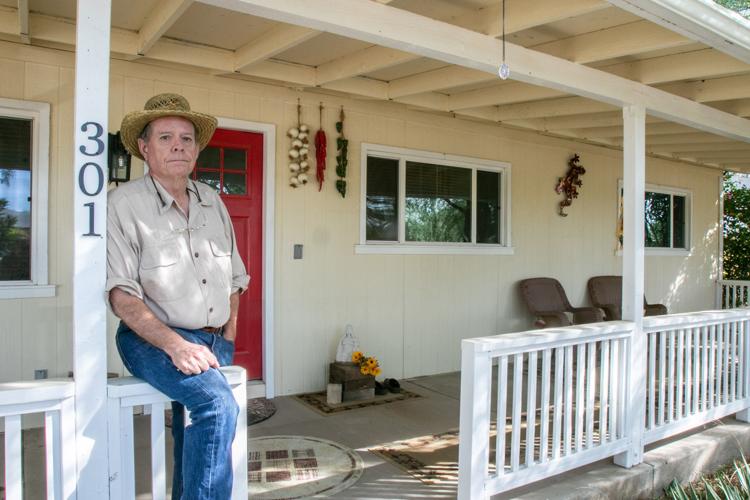Residents of the small community of Ajo won’t face massive increases in their utility rates — at least for now.
On Wednesday, state regulators rejected major rate increases requested by an Ajo utility owned by mining giant Freeport McMoRan Inc. after pleas from customers that the rate hikes are unjust and would pose a serious financial hardship on the community’s many poor and elderly residents.
Under a modified proposal before the Arizona Corporation Commission, about 950 water, sewer and electric customers of Ajo Improvement Co. would have seen their water rates rise 206%, their sewer rates increase 334% and their electric rates jump 95%, all over a seven-year phase-in period.
The proposed order by a commission administrative judge had cut Ajo Improvement’s original request for increases of up to 500% and extended a five-year phase-in period proposed by the utility.
But that didn’t sway enough commission members.
Commissioners Andy Tobin, Boyd Dunn and Sandra Kennedy voted against the proposed order, with member Justin Olson and Chairman Bob Burns voting for it.
Now, the company must persuade the commission to reconsider its decision or file a new rate case.
Tobin, who attended the commission’s open meeting via teleconference from Ajo, said the increases were too much for ratepayers to bear and faulted Freeport and its predecessor, Phelps Dodge Corp., for letting the utility systems fall into disrepair and then delaying requests for new rates for more than a decade.
“This burden is not reasonable. It pretends the rate increases will not affect the community, and this should never have been prolonged beyond the closure of the mine (in 1983).”
The commission rejected Tobin’s amendment to extend the rate increase phase-in period to 25 years, before voting down the proposed rate order.
“No one can believe this rate case is in standing with this commission’s long history of protecting the ratepayer,” Tobin said.
Michael Patten, an attorney representing Ajo Improvement Co., noted that the company had made a number of concessions in its rate request to mitigate the impact of the rate increases.
After a series of hearings, a Corporation Commission administrative law judge issued a recommended order in early April that lowered the increases and stretched the phase-in period for the new rates over seven years instead of five.
The company agreed to the longer phase-in and said it was seeking only to cover its costs under a set overall operating profit margin, rather than earning a return on its infrastructure investment, forgoing $7.6 million in revenues over seven years.
“Ajo (Improvement Co.) has proposed what I believe are unprecedented mitigation measures,” Michael Patten, an attorney representing the utility, told the Corporation Commission. “I would argue that it’s a fair balance, and at seven years from now, the rates will barely be covering Ajo’s operating expenses.”
Scores of Ajo residents who traveled to Phoenix on Tuesday for the first day of the commission’s monthly open meeting or attended a teleconference in Ajo said the rate increases would devastate the community.
Robert Sorrels, an Ajo resident who formally intervened in the rate case, told the commission during debate on Tuesday that the proposed rate hikes would have forced some older Ajo residents on fixed incomes to choose between buying medication and food or paying their utility bills.
“Ajo is one of the three poorest towns in Arizona,” said Sorrels, 69, a photographer and former college math teacher and dean who moved to Ajo about eight years ago. “You’re talking about a community that doesn’t have much but the grit and will to survive.”
He noted that 15 percent of Ajo residents live on less than $15,000 a year and the average age of residents is 12 years older than the state average.
“If you push these rates through, some of our oldest will die,” Sorrels said.
Pima County officials opposed the rate increases on behalf of Ajo residents, arguing that Freeport and should be responsible for the infrastructure costs because the mining company neglected the utility systems for decades.
Commissioner Justin Olson said he didn’t support forcing Ajo Improvement and Freeport to bear the cost of the system improvements because he considered it an unconstitutional confiscation of private property, citing crisis-torn Venezuela as a failed experiment in socialism.
“We are not authorized to take the property of this corporation and give it to the residents of Ajo,” Olson said. “I cannot compel them to continue to subsidize rates.”
“This isn’t Venezuela. This is a monopoly here; there’s no capitalism. The people have no choice here,” Tobin responded. “They want to pay the bill; they just need more time.”
Ajo Improvement filed in December 2017 for new rates that would over five years triple the average home customer’s water bill, double the typical electric bill and more than quadruple the average sewer bill.
The utility, which was formed by Freeport predecessor Phelps Dodge Corp., said it needed to recover some $48 million in system improvements it funded over the last decade and noted that its customers have been paying much lower rates than neighboring utilities because of Freeport’s subsidy of rates.
Sorrels and other Ajo residents said community members have worked hard to revive the town after most of the town’s residents lost their jobs and moved after the closure of the adjacent New Cornelia Mine in 1983.
The community renovated the historic Curley School and reopened it as an artisan residence in 2007 as a centerpiece of economic development, but the utility rate increases threatens that progress, some residents said.
Bo Johnson, executive director of the Ajo District Chamber of Commerce and a fifth-generation Ajo native, said the prospect of huge utility rate hikes already have begun chilling demand for real estate.
“After 35 years of crawling back and finding a new identity for ourselves, this rate hike would put a halt to that progress,” Johnson said.





